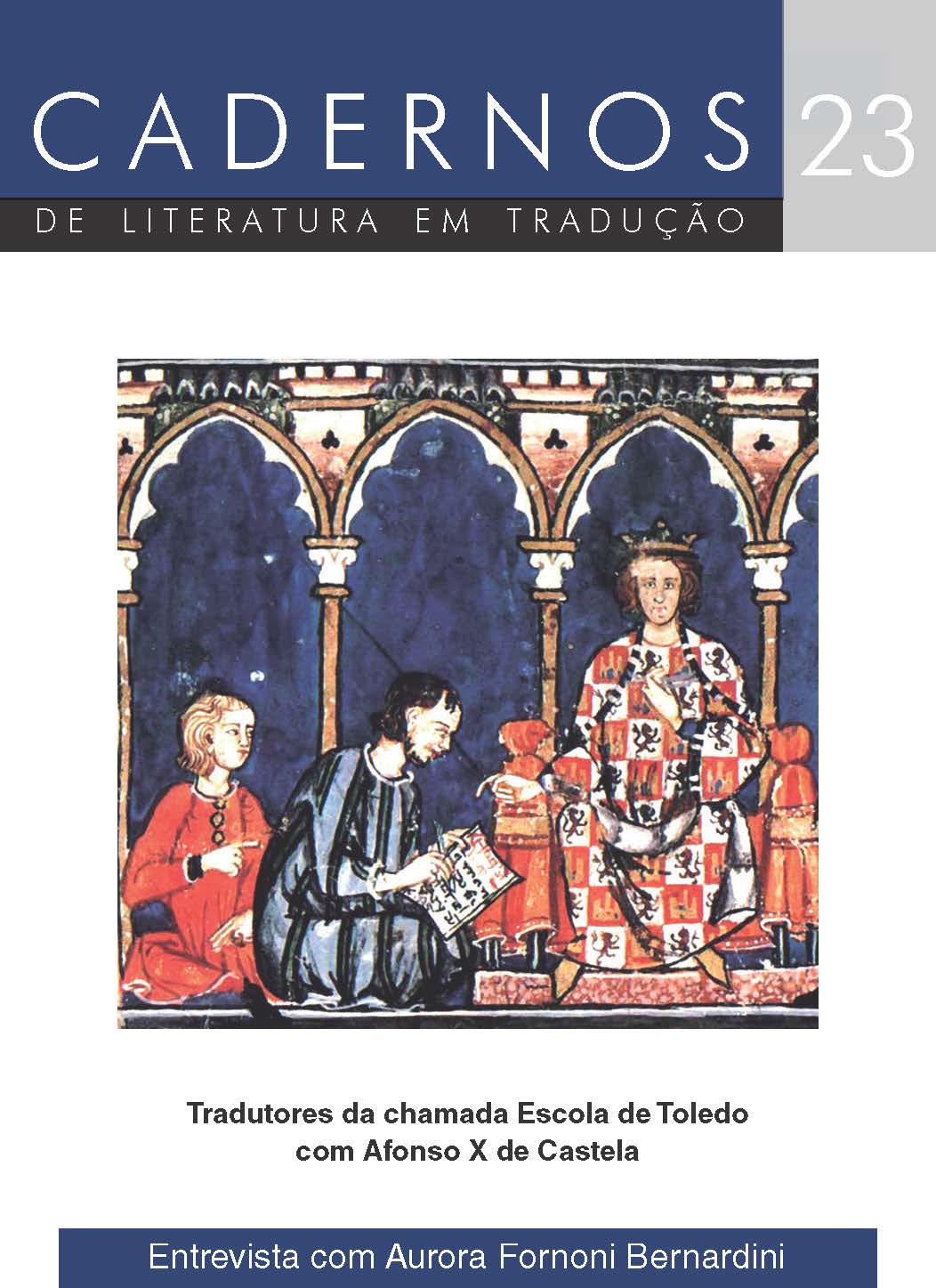A Escola de Tradutores de Toledo: a oralidade da escrita
DOI:
https://doi.org/10.11606/issn.2359-5388.i23p417-435Palavras-chave:
Escola de Tradutores de Toledo, História da tradução, Oralidade da escritaResumo
Este artigo se volta para a análise da chamada Escola de Tradutores de Toledo, surgida na época da Primeira Cruzada, e se propõe a questionar e reformular o que se sabe sobre os seus métodos, personagens, tradutores e época, sobretudo a questão do papel da oralidade na criação, controle e eventual censura das traduções produzidas por intérpretes e tradutores hebreus, muçulmanos, convertidos e cristãos, hispânicos e francos; também, o que isso ainda afeta e pode contribuir para a prática, história e teoria da tradução
Downloads
Referências
ALFONSO. Primera crónica general: estoria de España que mandó componer Alfonso El Sabio y se continuaba bajo Sancho IV en 1289.
BASTIN, G. L., & BANDIA, P. F. Charting the Future of Translation History. Ottawa: University of Ottawa Press, 2006.
BENMAKHLOUF, A. Averróis. (G. J. Teixeira, Trad.). São Paulo: Estação Liberdade, 2006.
BERMANN, S., & WOOD, M. (Eds.). Nation, language, and the ethics of translation. Princeton, N. J: Princeton University Press, 2005.
BORGES, J. L. Obras completas. Buenos Aires: Emecé, 1974.
BURNETT, C. The Coherence of the Arabic-Latin Translation Program in Toledo in the Twelfth Century. Science in Context, 14, pp. 249-288 doi:10.1017/S0269889701000096. In: C. Burnett (2001).
FEUCHTWANGER, L. Die Jüdin von Toledo. Frankfurt am Main: Roman-Fischer Taschenbuch Verlag, 1983.
FOLENA, G. Volgarizzare e tradurre (Vol. Volume 605 de Piccola Biblioteca Einaudi). Turim, Itália: G. Einaudi, 1994.
HIPONA, A. d. The Confessions of Saint Augustine. San Diego, Ca: ICON Group International, 2005.
HSIA, R. P.-c., & BURKE, P. A tradução cultural nos primórdios da Europa moderna. (R. M. Santos, Trad.). São Paulo: UNESP, 2009.
HUNG, E. (Ed.). Translation and cultural change: studies in history, norms, and image projection. Amsterdam: Philadelphia: John Benjamins Pub. Co, 2005.
JOURDAIN, A. Recherches critiques sur l’âge et l’origine des traductions latines d’Aristote. Paris: Paris Joubert, 1843.
KALTNER, J., & MCKENZIE, S. L. (Eds.). Beyond Babel: a handbook for biblical Hebrew and related languages. Atlanta: Society of Biblical Literature, 2002.
KERMODE, L. E. Aliens and Englishness in Elizabethan Drama. Cambridge: Cambridge University Press, 2009.
LEWIS, B. From Babel to dragomans: interpreting the Middle East. New York: Oxford University Press, 2004.
MENOCAL, M. R. The Arabic Role in Medieval Literary History. University of Pennsylvania Press, 2004.
NARVÁEZ, D., & Lapsley, D. K. (Eds.). Personality, identity, and character: explorations in moral psychology. New, York, Cambridge: Cambridge University Press, 2009.
NEBRIJA, A. d. Gramática de la lengua Castellana. Salamanca, 1492.
NUNES, C. O. Leitura na Idade Média: a ruptura com a oralidae. Biblos, Rio Grande, 21: 0-000, 2007.
PALENCIA, Á. G. Los mozárabes de Toledo en los siglos XII y XII (Vol. Volume preliminar). Madri: Institudo de Valencia de Don Juan, 1930.
PALENCIA, Á. G. Los mozárabes de Toledo en los siglos XII y XII (Vol. Volume II). Madri: Instituto de Valencia de Don Juan, 1930.
PALENCIA, Á. G. Los mozárabes de Toledo en los siglos XII y XII (Vol. III). Madri: Instituto de Valencia de Don Juan, 1930.
PICK, L. K. Conflict and Coexistence: Archbishop Rodrigo and the Muslims and Jews of Medieval Spain. Michigan: University of Michigan, 2004.
RENAN, E. Averroes y el Averroísmo. Madrid: Hiperion, 1992.
SANTOYO, J.-C. Blank Spaces in the History of Translation. In: G. L. Bastin, & P. F. Bandia, Charting the Future of Translation History (pp. 11-43). Ottawa: University of Ottawa Press, 2006.
SCHOLEM, G. G. O nome de Deus: A teoria da linguagem e outros estudos de cabala e mística: judáica II. (J. Guinsburg, & R. J. Solon, Trads.). São Paulo: Perspecitiva, 1987.
SPOLSKY, B. The languages of the Jews: a sociolinguistic history. New York: Cambridge University Press, 2014.
Downloads
Publicado
Edição
Seção
Licença

Este trabalho está licenciado sob uma licença Creative Commons Attribution 4.0 International License.


